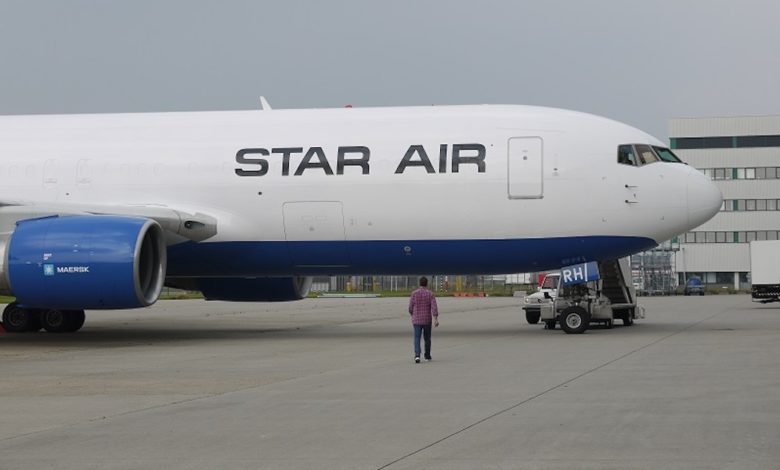Maersk spends some of its multi-billion dollar war chest to bolster air freight position

Cash-rich A.P. Moller – Maersk is upping its airfreight game, buying German freight forwarder Senator International as well as expanding its air freighter fleet by five planes.
“Air freight is a crucial enabler of flexibility and agility in global supply chains as it allows companies to tackle time-critical supply chain challenges and provides transport mode options for high value cargo. To better cater to customers´ needs, Maersk aims to increase its presence in the global air cargo industry,” the Danish carrier stated today, following the contrails of French rival CMA CGM, which has also been using cash accrued during container shipping’s greatest peak to push more into air freight.
Air freight is a crucial enabler of flexibility and agility in global supply chains
Maersk is purchasing two new B777F and leasing three B767-300 cargo planes. To operate and manage this added capacity, the cargo airline Star Air – the internal air cargo operation of Maersk established in 1987 – will become a key vehicle supporting Maersk’s logistics offering.
“As a global provider of integrated logistics, Maersk is improving the ability to provide a one-stop-shop and end-to-end logistics capabilities to our customers. We have strengthened our integrated logistics offering through e-commerce logistics acquisitions, tech investments, expanding our warehouse footprint and, as a natural next step, we are now ramping up our air freight capacity significantly and creating a broader network to cater even better for the needs of customers,” said Vincent Clerc, executive vice president and CEO of ocean and logistics at A.P. Moller – Maersk.
Senator joins Maersk in a $644m deal having built an airfreight operation centered around own controlled capacity using 19 weekly flights across its network.
The German company brings a technology advantage with its Cargo Wise One core operating platform, a single system which will accelerate the integration with Maersk’s Air and less than container load products.
Maersk’s ambition is to have approximately one third of its annual air tonnage carried within its own controlled freight network. This will be achieved through a combination of owned and leased aircraft, replicating the structure that the company has within its ocean fleet. The remaining capacity will be provided by strategic commercial carriers and charter flight operators.
A.P. Moller – Maersk revealed stellar Q3 results today with revenues up 68% year-on-year to $16.6bn, and EBITDA tripling to $6.9bn while EBIT was up almost five times to $5.9bn.
“In the ongoing exceptional market situation with high demand in the USA and global disruptions to the supply chains, we continued to increase capacity and expand our offerings to keep cargo moving for our customers,” commented Soren Skou, the group’s CEO and architect of its ongoing logistics integrator strategy.
Skou revealed that the carrier’s goal to get more clients signed up to long-term contracts was gaining ground. Currently 64% of Maersk’s long-haul volumes are on long-term contracts compared to 50% a year ago, including multi-year contracts of more than 1.4m feu.

So much for reducing emissions!